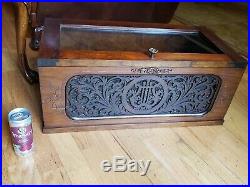
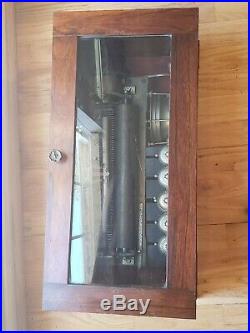
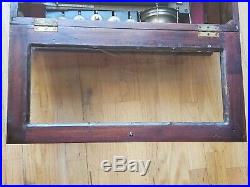
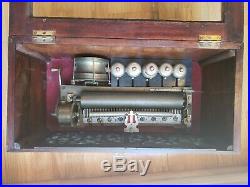
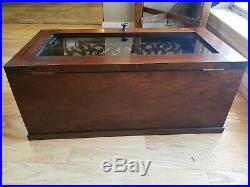
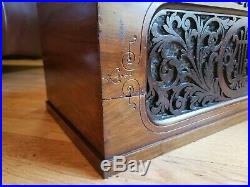
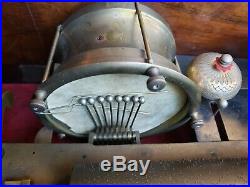

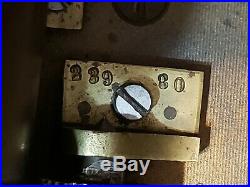
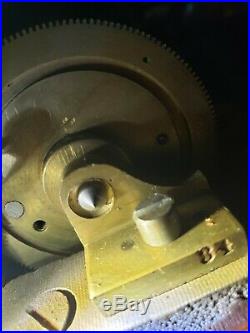
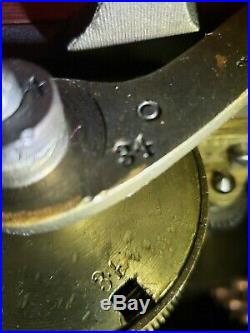


This is what I believe to be a very early Gautschi music box. It is the earliest dated music box I could find from the Gautchis in my research. I have listed all the signifying numbers and marks in the pictures and wrote them out below. The cylinder DOES play through each song uninterrupted and the lever winds perfectly but the spinning fan needs a few nudges to get it going (needs cleaning). After each song plays it stops completely then you have to restart the cylinder for the next song. All the mechanics appear to work just as they should. I’ve included everything I know to be wrong with it. If I have missed anything it’s because it goes beyond my understanding. To the best of my knowledge here is what needs to be fixed when being restored. Drum skin needs refinishing. Drum, cylinder and bells need tuning but all mechanically function as they should. Crack in the left face of the wood case (see 6th pic , doesn’t look structural and feels firm) crack does not extend beyond what’s seen in the picture, nothing beside it. Three comb teeth need re-tipping (the very ends). Serial number 239 80. The number 34 engraved on base, cylinder, lever and spinning fan. 086 hand etched into the side of cylinder. All are exact Dimensions and are as follows. Case length 24.25 wide. Case depth 12.25. There is a great story you might want to read below. I was given permission from the author to include this in the sale. Philadelphia Stories by Bob Mcnulty. Heinrich (Henry) Adolph Gautschi was born on March 14, 1846, in St. At age 19, he married Christina Schneider (who was nine years his senior). Together, the newlyweds emigrated to Pittsburgh where Henry opened a tobacco shop on Market Street at Third Avenue (the PPG Wintergarden stands there now), just a few blocks distance from the confluence of the Monongahela and Allegheny Rivers. Henry and Christina had seven children: Annie, Henry Jr. William, Flora, Ida, Robert and Bertha. In 1873, Henry was forced into bankruptcy when his store failed. They then moved back to St. Croix where Henry found work as a farmer. Henrys older brother, Christian, manufactured music boxes in Geneva. In 1876, it was decided that C. Gautschi & Company would open a North American branch in Philadelphia, with Henry as manager. Henry, along with his wife and children, arrived in New York on May 11, 1876. Shortly thereafter, they moved to 3957 Aspen Street in West Philadelphia. Henry opened the C. Gautschi & Company music box showroom at the northeast corner of 10th and Chestnut Streets. In 1880, the showroom moved to 1018-20 Chestnut Street formerly St. By 1884, Henry was no longer satisfied with his arrangement as manager for C. He felt that he had earned a partnership, but the home office (his brother) in Geneva did not agree. So, in May 1884, he broke ties with C. Gautschi & Company and began to manufacture his own music boxes. Gautschi and Sons (though his three boys at the time were just 14, 12, and 5 years old) at 1030 Chestnut Street, just five doors away from the C. After one year of direct competition, Henry won the music box war; C. Gautschi & Company closed its doors in June 1885. By 1887, Henry boasted the largest stock of interchangeable music cylinders in the world. Besides sales, he also offered expert repair work. In 1889 and again in 1892, he was awarded patents for the mechanical designs of his music boxes. In 1895, Gautschi became the official Philadelphia dealer of Regina Music Boxes, which played flat metal discs instead of cylinders. During these years, he became very wealthy. From 1880 until 1891, the Gautschi family lived in the Nicetown section of Philadelphia. Their addresses were: 3412 N. On May 3, 1887, Henry and Christinas son, William, died at age 15 of chronic Brights (kidney) Disease. His burial opened the Gautschi family plot at Ivy Hill Cemetery. In April 1891, Henry moved his family to 208 W. Highland Avenue in Chestnut Hill, just two miles away from Williams grave. As the summer turned to fall in 1892, Christina developed phlegmonous erysipelas (a painful skin inflammation caused by a bacterial infection). She died on October 25, 1892 (President Benjamin Harrisons wife, Caroline, died at the White House on the same day). Not long after his wifes death, Henry hired a middle-aged Austrian widow as a live-in cook. Her name was Anna Pesendorfer. Anna was born in Vienna in June 1848. In 1873, she married Louis Pesendorfer, who died not long after their son, Jacob, was born on May 20, 1874. In 1889, Anna emigrated to Philadelphia, leaving behind her 15-year-old son, who was learning the blacksmith trade. Anna promised Jacob that she would send for him as soon as she could earn his passage. In 1893, she became Henry Gautschis cook and within a year, she had enough saved to send for Jacob. Jacob Pesendorfer was 20 years old when he arrived at Pier 53 in South Philly on August 22, 1894. He settled in Berlin, New Jersey, where he found work as a machinists helper. He visited his mother in Chestnut Hill every weekend and became well acquainted with Henry Gautschis eldest daughter, Annie, who was helping him to learn English. A romance developed between Jacob and Annie (who was six years his senior), which displeased her father very much. Henry wanted better for his daughter than a penniless immigrant, so he fired Anna and forbade Annie from seeing Jacob. Jacob, though, continued to court Annie in secret and on August 4, 1896, they eloped and were married at Old Zion Lutheran Church 628 N. They set up house in Audubon, New Jersey, and Annie was soon pregnant. He phoned Jacobs employer and had him fired. Henry repeated this tactic every time Jacob found a new job, making it impossible for him to earn a living. On March 27, 1897, just six weeks before her due date, Annie received a letter from her father. In it, he said that he would never accept Pesendorfer as his son-in-law. If she would leave Jacob, Henry promised to provide for her and her child. If she decided to remain with Jacob, then she would get nothing. Henry knew his daughter well. She showed Jacob the letter and left him that evening. The court sided with Henry. Four weeks later, on May 2, 1897, Annie gave birth to their son, Raymond Gautschi Pesendorfer. At the Gautschis Chestnut Hill home, Jacob was strictly persona non grata and he was not allowed access to his newborn son. On one blistering hot summer evening in 1900, Jacob attempted to take Raymond. He pushed past the Guatschis housekeeper, Theresa Newman, at the front door and as he searched for the boy from room to room, the police were called. They arrived just as Jacob was attempting to choke the life out of Henry. He was arrested, but all charges were dropped on the condition that he never again bother them. For more than a year, Jacob kept his distance, but he was seething. Henry Gautschi had taken everything from him. By September 1901, he decided that it was time to return the deed. On September 4, 1901, Jacob learned that Henry was in Lansdale at the home of J. Rufe (15 Green Street). Rufe was a carpenter and Henry accompanied him there to look at some blueprints for a new home that he was planning to have built. Jacob knew that Henry would be returning home via the Bethlehem Pike and he took up his position behind a tree just beyond the tollgate at Stenton Avenue. From Jacobs vantage point, he could see clearly everyone passing through the tollgate. Just before 7 p. He spied his target; Henry was a passenger in Rufes open carriage. Without hesitation, Jacob charged the carriage, shouted Now it is my time! And fired six shots from his revolver in rapid succession. The first shot grazed Rufes neck. The second, third and fourth shots found Henrys back. The fifth shot hit the horse in the leg and the sixth shot just missed Henry as he fell unconscious from the carriage. Jacob made no attempt to escape. He just stood over Henry and savored the moment. Within a minute, Officer Edward Leo, who had heard the shots, was on the scene and arrested Jacob without incident. Henry was rushed to Germantown Hospital and Jacob was taken to the 14th District Station House, where he told the police I did it for revenge. I hope I did my work. Surgeons were able to remove two of the bullets from Henrys back, but the third one was lodged in his right lung. He would have to regain some strength before they could attempt to extract it. At first it was thought that Henry would recover, but he rapidly developed pneumonia and passed away on September 8, 1901. Four days later, he was buried with his wife and son at Ivy Hill Cemetery. Jacob was arraigned on September 30, 1901. He waived his right to a jury trial and entered a guilty plea which was accepted by Judge Charles Audenreid. Four days later, after interviewing the witnesses, Audenreid decided that it was a case of murder in the first degree and sentenced Jacob to death. This was the first (and perhaps only) time in Philadelphia that a man was sentenced to die for a murder without having first been convicted by a jury. Jacob was completely taken aback. By pleading guilty, he expected a lighter sentence. When asked if he had any reason why the sentence should not be passed, Jacob could not answer. He simply put his head down on the wooden rail in front of him and checked out of reality (or so it seemed). Jacob was sent to Moyamensing Prison to await his execution, which was scheduled for March 14, 1902. All the while, he refused to speak. One hour before the trap door was to spring beneath him, Governor William Stone postponed the hanging to give the Board of Pardons time to consider his sanity. Sheriff Wencil Hartman told this to the Allentown Morning Call: I expected a respite. Pesendorfer can not utter an intelligent word. He does not seem to know or appreciate that he is to be hanged. In fact he is an absolute mental wreck. The rector of St. Alphonses Catholic Church, who has acted as his spiritual advisor, saw me today and stated that he considered the condemned man a lunatic. He is in no condition mentally or physically to be hanged. On April 24, it was decided to commute his sentence to life in prison. On the following day, Jacob was transferred to Eastern State Penitentiary as prisoner 1381. On July 14, 1902, Annie was granted a divorce from Jacob and she reverted back to her maiden name. She made a clean break from the past and gave Raymond up for adoption. On February 4, 1903, she married Max C. Kluge, a butter and egg man from Feltonville. Despite her wealth, they lived quite modestly. Annie and Max had two children and in 1907, they moved to Wissinoming. Max died in 1917, of pneumonia. On December 6, 1930, Annie was diagnosed with senile dementia and she spent her last years living at the Belle-Vista Sanitorium in Whitemarsh. She died on June 30, 1939. In December 1905, after four years of absolute silence, the court appointed a commission to determine the state of Jacobs sanity. They transferred him to the Norristown State Asylum in May 1906. As soon as he entered the asylum, Jacob began to speak again. After 16 months of mental evaluation, the doctors at Norristown all agreed that Jacob was perfectly sane and had very possibly been shamming everyone. Jacobs mother, Anna, took a job as a washerwoman and moved to a dilapidated wood-frame house at the rear of 914 Cherry Street. She visited him at Eastern State once a week until 1913, when she took ill. When Jacob learned that she was sick, helpless, penniless and out of work, he made up his mind that he would support her. His work was admired by all who saw it. In 1914, Jacob asked the warden if he could design and build a clock for the watchtower. The warden agreed and gave him a three room workshop. The clock had two faces, one was 36 inches in diameter and the other was 42 inches. The clock was illuminated at night and chimed bells every hour. The clock needed to be wound just once a month and Jacob was awarded a patent for the winding mechanism; the time works and the striking works could be wound together instead of separately, as was the norm. It took three years for Jacob to complete the clock. When it was finally finished, he was very proud of his creation, and the warden was proud of his model inmate, who by now was known as Lifer Jake. His boxes were so popular that he was allowed to employ 18 other inmates in his wood shop. Jacob applied to the State Board of Pardons for his freedom on May 21, 1919, but was denied. He applied again on October 19, 1926, and was again denied. However, he had won the respect and admiration of his captors, and they went to bat for him. Somehow, they were able to get Jacob on the list of those being considered for the governors annual Christmas pardon. On the morning of December 20, 1926, word came from Harrisburg: Governor Pennypacker had pardoned Lifer Jake. Deputy Warden Captain Herbert Smith was so excited that he ran the entire length from his office to Jacobs workshop behind Block 7. Jake youre free, the governor has pardoned you! Smith exclaimed as he burst into the workshop. Jacob dropped the chisel that he was using to carve his mothers Christmas present. Is that true, Captain? He asked in a low, almost inaudible voice. Smith assured him that it was true, that hed be home with his mother by dinner time. As his employees rushed around him to offer their congratulations, Jacob broke down and cried like a baby. The paperwork necessary for Jacobs pardon arrived at 4 p. Smith had this to say to the Associated Press: Pesendorfer is a most unusual man and the only one of his type in the prison. He has the universal respect of guards and prisoners. In a way, we will be sorry to see him go. Jacob was led from his cell to the huge front gate at Fairmount Avenue. As he walked to freedom, a line of guards followed behind him, cheering and applauding. One of the prison chaplains, Rev. Lynn Bowman, drove Jacob to his mothers home at 5 Arlington Avenue in Berlin. As Jacob stepped into his mothers living room that was newly decorated with fresh Christmas greens, Anna threw her arms around him, laughing and crying at the same time, and exclaimed that this was the happiest day of her life. Jacob attributed his release to Annas devotion and daily prayers. He told a reporter covering his homecoming that he wanted to forget the past and focus on taking care of Ma. Anna overheard him, gave him another hug, and replied that they would live down his prison record together. Jacob bought some land in West Berlin, with intentions to build a factory where he could employ ex-convicts to give them a fresh start in life. When the local residents found out, a petition was circulated opposing the plan. Jacob went before the Business Mens Association and the factory was then approved with acclaim. It stood two stories tall and the walls were completely made from glass, because while in prison, they didnt get much sunshine. At the factory, Jacob manufactured custom-order radio cabinets, model ships, humidors and inlaid tables and jewel cases. By 1928, Jacob employed 15 men. He would give anyone a chance, with just two rules: stay on the level and total abstinence from liquor. In 1929, Anna, at age 81, became hopelessly senile and Jacob found it necessary to place her as an inmate in the Camden County Insane Hospital at Lakeland (Blackwood), where she would spend the last few years of her life. Later that year he married a divorced Hungarian woman, Margaret Steffan Cleve. Jacob kept the factory open through the 1930s and 40s. He retired on October 17, 1950 at age 76. Three months later, he lost his car, a 1941 Studebaker Champion Club Sedan, in a sheriffs sale. His wife, Margaret, died after a long illness on July 15, 1956. Jacob became despondent and three months after Margarets death, he attempted to commit suicide by slashing his throat. He was found in time by a concerned friend who rushed him to Our Lady of Lourdes Hospital. Jacob died on April 2, 1961 and was laid to rest with Margaret at the Gate of Heaven Cemetery in Berlin. The last line of his obituary stated: Mr. Pesendorfer did not leave any immediate family. Certainly, the scores of ex-cons whom he helped over the years would take issue with that statement. Researched and written by Bob McNulty July 15, 2018. The item “Antique Music Box (Gautschi)” is in sale since Sunday, August 30, 2020. This item is in the category “Collectibles\Decorative Collectibles\Music Boxes\Pre-1900″. The seller is “tre-hoffm” and is located in Kingwood, Texas. This item can be shipped to United States, Canada, United Kingdom, Denmark, Romania, Slovakia, Bulgaria, Czech republic, Finland, Hungary, Latvia, Lithuania, Malta, Estonia, Australia, Greece, Portugal, Cyprus, Slovenia, Japan, China, Sweden, South Korea, Indonesia, Taiwan, South africa, Thailand, Belgium, France, Hong Kong, Ireland, Netherlands, Poland, Spain, Italy, Germany, Austria, Bahamas, Israel, Mexico, New Zealand, Singapore, Switzerland, Norway, Saudi arabia, United arab emirates, Qatar, Kuwait, Bahrain, Croatia, Malaysia, Brazil, Chile, Colombia, Panama, Jamaica, Barbados, Bangladesh, Bermuda, Brunei darussalam, Bolivia, Ecuador, Egypt, French guiana, Guernsey, Gibraltar, Guadeloupe, Iceland, Jersey, Jordan, Cambodia, Cayman islands, Liechtenstein, Sri lanka, Luxembourg, Monaco, Macao, Martinique, Maldives, Nicaragua, Oman, Peru, Pakistan, Paraguay, Reunion, Viet nam, Uruguay.
- Time Period Manufactured: Pre-1900

